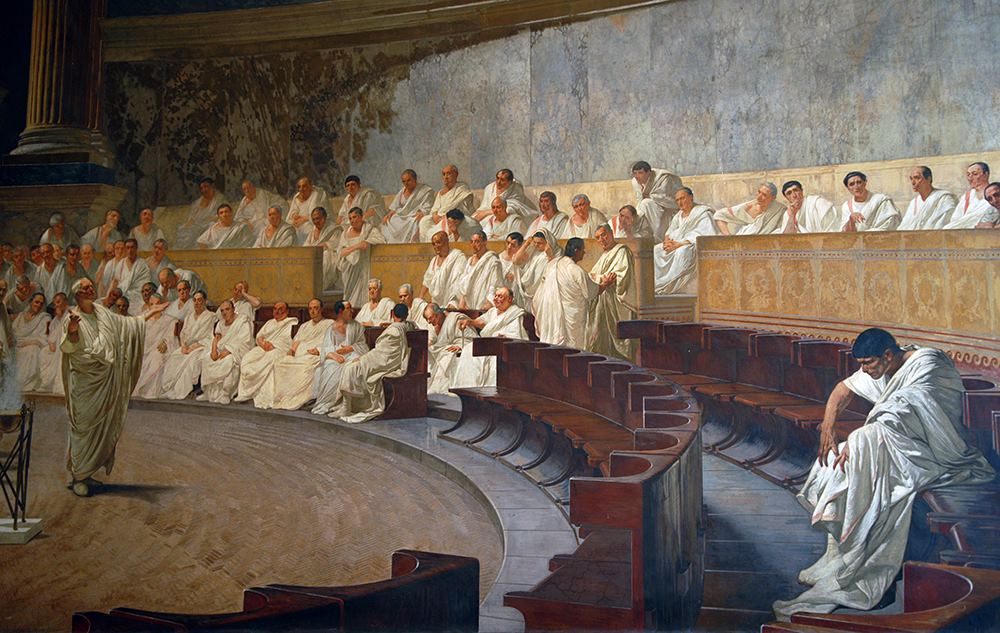Cicero’s four advantages of old age
Marketing to home care clients involves engaging them with helpful insights into life’s problems. That means helping them deal with the struggles and perplexities of old age.
Nothing seems more devastating than declining health as one grows older. In Shakespeare’s play As You Like It, old age is likened to a kind of “second childishness and mere oblivion.” One character says, “Sans teeth, sans eyes, sans taste, sans everything.”
Sans of course, means without. If our clients lose these faculties, life is difficult – it’s a kind of Good Friday of their lives.
However, Cicero, the great Roman orator and leader, pointed out four arguments that disprove the “disagreeables” of old age. In fact, these insights show old age as “luxurious and delightful.” In his book, Old On Age, Cicero outlines these four points.
1. Does it withdraw us from an active lifestyle?
Not really. Cicero argues that various employments can be carried out by the intellect, even when bodies have lost the vigor of youth.
He says,
“The great affairs of life are not performed by physical strength, or activity, or nimbleness of body, but by deliberation, character, of expression of opinion. Of these old age is not only not deprived, but, as a rule, has them in a greater degree.”
The great orator advises,
“Old men retain their intellects well enough, if only they keep their minds active and fully employed.”
2. Do the elderly miss the bodily strength of young men?
Cicero says that he does not miss this, “any more than as a young man I missed the strength of a bull or an elephant.” He argues that “you should use what you have, and whatever you may chance to be doing, do it with all your might.”
As far as the physical drawbacks of old age, he says that we should “fight it as we should an illness”:
“We must look after our health, use moderate exercise, take just enough food and drink to recruit, but not to overload, our strength. Nor is it the body alone that must be supported, but the intellect and soul much more. For they are like lamps: unless you feed them with oil, they too go out from old age.”
3. Do the elderly lack sensual pleasure?
Yes, but these enjoyments are the least in important in life – and they court danger as well. Cicero quotes a certain Archytas in saying,
“No more deadly curse than sensual pleasure has been inflicted on mankind by nature, to gratify which our wanton appetites are roused beyond all prudence or restraint. It is a fruitful source of treasons, revolutions, secret communications with the enemy…. Intellect is the best gift of nature or God: to this divine gift and endowment there is nothing so inimical as pleasure.”
He says that pleasure that is enjoyed is like the young person seated in the front row of a theater, rather than in the last. The man in the last row gets pleasure, too:
“So youth, because it looks at pleasures at closer quarters, perhaps enjoys itself more, yet even old age, looking at them from a distance, does enjoy itself well enough.”
4. Does being old trouble you with the nearness of death?
Cicero poses two possibilities of what happens upon death. If death “extinguishes the soul,” it is to be “totally disregarded.” If, on the other hand, it brings him to where he exists forever, “it is even to be desired.”
He brings up this argument: A young person expects to live long. The older person “is in a better position than a young man, since what the latter only hopes for he has obtained.”
He compares the stages of life to spring, summer and autumn. “Now the harvest of old age is … the memory and rich store of blessings laid up in earlier life.”
The death of the young person “seems to me to like putting out a great fire with a deluge of water; but old men die like a fire going out because it has burnt down of its own nature.”
We are making good use of old age “as long as you can satisfy the call of duty and disregard death. The result of this is, that old age is even more confident and courageous than youth.”
Finally, Cicero shows that he believes in eternal life, which may seem odd to modern ears since he lived before the time of Christ.
“Oh glorious day when I shall set out to join that heavenly conclave and company of souls, and depart from the turmoil and impurities of this world.”
These thoughts will certainly relieve the anxieties of the home care clients of ours who are elderly.


